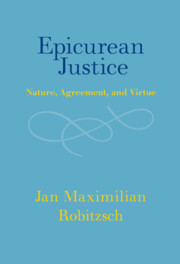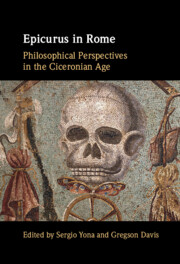38 results
Chapter 9 - Epicureans on Preconceptions and Other Concepts
-
-
- Book:
- Conceptualising Concepts in Greek Philosophy
- Published online:
- 25 April 2024
- Print publication:
- 02 May 2024, pp 203-236
-
- Chapter
-
- You have access
- Open access
- HTML
- Export citation
LUCRETIUS’ HOMERIC MOURNERS
-
- Journal:
- The Classical Quarterly / Volume 74 / Issue 1 / May 2024
- Published online by Cambridge University Press:
- 19 April 2024, pp. 331-336
- Print publication:
- May 2024
-
- Article
-
- You have access
- HTML
- Export citation
Chapter 7 - Conclusion
-
- Book:
- Epicurean Justice
- Published online:
- 07 March 2024
- Print publication:
- 14 March 2024, pp 161-164
-
- Chapter
- Export citation
Chapter 2 - Contractual Justice
-
- Book:
- Epicurean Justice
- Published online:
- 07 March 2024
- Print publication:
- 14 March 2024, pp 49-79
-
- Chapter
- Export citation
Introduction
-
- Book:
- Epicurean Justice
- Published online:
- 07 March 2024
- Print publication:
- 14 March 2024, pp 1-13
-
- Chapter
- Export citation
Chapter 5 - Justice and Law
-
- Book:
- Epicurean Justice
- Published online:
- 07 March 2024
- Print publication:
- 14 March 2024, pp 118-127
-
- Chapter
- Export citation
Chapter 4 - Moral Psychology
-
- Book:
- Epicurean Justice
- Published online:
- 07 March 2024
- Print publication:
- 14 March 2024, pp 98-117
-
- Chapter
- Export citation
Chapter 3 - Aretaic Justice
-
- Book:
- Epicurean Justice
- Published online:
- 07 March 2024
- Print publication:
- 14 March 2024, pp 80-97
-
- Chapter
- Export citation
Chapter 6 - Ethical Naturalism
-
- Book:
- Epicurean Justice
- Published online:
- 07 March 2024
- Print publication:
- 14 March 2024, pp 128-160
-
- Chapter
- Export citation
Chapter 1 - The Origin of Justice
-
- Book:
- Epicurean Justice
- Published online:
- 07 March 2024
- Print publication:
- 14 March 2024, pp 14-48
-
- Chapter
-
- You have access
- HTML
- Export citation

Epicurean Justice
- Nature, Agreement, and Virtue
-
- Published online:
- 07 March 2024
- Print publication:
- 14 March 2024
THE STRANGE ABSENCE OF HORT- IN LUCRETIUS
-
- Journal:
- The Classical Quarterly / Volume 73 / Issue 2 / December 2023
- Published online by Cambridge University Press:
- 09 January 2024, pp. 926-928
- Print publication:
- December 2023
-
- Article
-
- You have access
- HTML
- Export citation
Chapter 4 - Ancient Women Epicureans and Their Anti-Hedonist Critics
-
-
- Book:
- Ancient Women Philosophers
- Published online:
- 17 August 2023
- Print publication:
- 31 August 2023, pp 77-95
-
- Chapter
- Export citation
LUCRETIUS’ RAZOR ON EPICURUS’ ATOMIC THEORY
-
- Journal:
- The Classical Quarterly / Volume 73 / Issue 1 / May 2023
- Published online by Cambridge University Press:
- 03 August 2023, pp. 160-168
- Print publication:
- May 2023
-
- Article
-
- You have access
- Open access
- HTML
- Export citation
Chapter 4 - Seneca and Epicurus
- from Part II - Rival Traditions in Philosophy
-
- Book:
- Seneca
- Published online:
- 23 March 2023
- Print publication:
- 30 March 2023, pp 87-108
-
- Chapter
- Export citation
Chapter 9 - Page, Stage, Image: Confronting Ennius with Lucretius’ On the Nature of Things
- from Part II - Epicurus and Lucretian Postures
-
-
- Book:
- Epicurus in Rome
- Published online:
- 13 January 2023
- Print publication:
- 09 February 2023, pp 147-167
-
- Chapter
-
- You have access
- Open access
- HTML
- Export citation
Chapter 10 - Lucretius on the Size of the Sun
- from Part II - Epicurus and Lucretian Postures
-
-
- Book:
- Epicurus in Rome
- Published online:
- 13 January 2023
- Print publication:
- 09 February 2023, pp 168-185
-
- Chapter
-
- You have access
- Open access
- HTML
- Export citation
Chapter 1 - Introduction
-
-
- Book:
- Epicurus in Rome
- Published online:
- 13 January 2023
- Print publication:
- 09 February 2023, pp 1-8
-
- Chapter
-
- You have access
- Open access
- HTML
- Export citation

Epicurus in Rome
- Philosophical Perspectives in the Ciceronian Age
-
- Published online:
- 13 January 2023
- Print publication:
- 09 February 2023
-
- Book
-
- You have access
- Open access
- Export citation
10 - False Prophets and Fake Prophecies in Lucian
-
-
- Book:
- Divination and Prophecy in the Ancient Greek World
- Published online:
- 22 December 2022
- Print publication:
- 05 January 2023, pp 240-260
-
- Chapter
- Export citation

